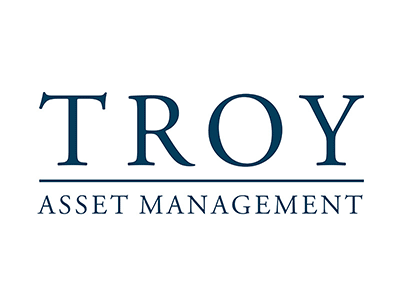James Harries is a highly experienced income manager with an enviable track record
Sheltering investors’ wealth when markets are volatile is the overarching focus of Troy’s approach
The fund has continued to experience less volatility than its peers, since launch in June 2016.
This fund is on the Wealth Shortlist of funds chosen by our analysts for their long-term performance potential
How it fits in a portfolio
Troy Trojan Global Income aims to deliver long-term income and capital growth. The manager aims to grow the income gradually over time rather than seeking higher but potentially unreliable yields, and focuses on high-quality companies. He believes investing for income globally is optimal as it provides a broader hunting ground than one country or region.
Given its focus on quality, this fund could work well alongside other investments in out-of-favour companies with recovery potential – also known as ‘value’ investing. It could also complement those targeting greater growth that don’t tend to pay dividends. Its global reach may also add diversification to an income-focused portfolio.
Manager
James Harries has managed this fund since launch in November 2016. He joined Troy in 2016 from Newton (BNY Mellon) where he managed global income funds from 2005 onwards. Harries is one of the most experienced global income managers around and we hold him in high regard.
In November 2020, Harries took over management of the Securities Trust of Scotland plc, a closed-ended fund (investment trust) that invests in a similar way to this fund. He’s also co-manager of the Ethical Global Income fund. Given the cross-over between these three portfolios we believe Harries is comfortably able to manage his time.
Tomasz Boniek supports Harries on his hunt for quality companies around the globe. He joined Troy from Susa Fund Management in 2017 and holds an MBA from the London Business School.
Process
Harries’ approach has all the hallmarks of a Troy fund – a focus on large, financially sound companies, that have shown their resilience through both good and bad times for the wider economy. He has scope to invest anywhere in the world but tends to favour developed markets, such as the US, UK and Europe. Although he can invest in higher-risk emerging markets, he tends to avoid them, preferring companies that sometimes sell their products in these regions.
His team pay close attention to free cash flow, a key measure of dividend sustainability. It shows what’s left over from running operations that can then be used for other purposes like paying a dividend, buying back shares, or reducing debt obligations. A company that generates healthy levels of free cash flow will, in theory, be able to sustain, or even increase how much they return to shareholders.
Every holding must pay a dividend, but the fund doesn’t have an income target. Harries is more focused on total return, a combination of income and growth, than income alone and won’t chase an unsustainable yield that is potentially damaging to long-term returns.
This is a concentrated portfolio of between 30-50 holdings. That means each company can have a significant impact on performance, although it’s a higher-risk approach. Sector-wise consumer staples, industrials and healthcare are where the manager currently finds the most opportunities.
When making any investment, the long-term is at the forefront of the team’s analysis. They don’t tend to react to short-term blips in the stock market or wider economy, preferring a low turnover approach, which means new purchases and sales are kept to a minimum. Only a few new ideas are considered each year, and the manager only sells shares if he feels the outlook has changed, the company becomes too highly valued, or he finds a better idea elsewhere.
Over the past 12 months, Harries has added several new names to the portfolio. Notably, they acquired shares in Canadian National Railway, capitalising on an attractive valuation. The team’s conviction lies in the industry’s growth trajectory as businesses increasingly shift from costly trucking methods to more economical railroads, helped driven by decarbonisation efforts.
Additionally, Harries expanded their position in American consumer healthcare company Kenvue. They acquired Kenvue when it was sold-off by Johnson & Johnson. Throughout the year, Harries continued to buy shares, despite the initial share price decline. His confidence stems from the belief that the market had oversold the shares and that Kenvue is a quality company, bolstered by a healthy dividend yield. Furthermore, a favourable litigation ruling has helped the share price begin to recover.
To fund these additions Harries sold out of Coca-Cola. He also reduced his investment in British technology company RELX. RELX had been performing strongly due to investor interest in AI exposure. Harries used the share price strength to move into other investment opportunities that he believes offer better prospects.
Investors should be aware that charges are taken from capital, which can increase the yield but reduces the potential for capital growth. The manager also has the flexibility to use derivatives which, if used, increases risk.
Culture
Troy Asset Management is an independent ‘boutique’ investment company. The majority of the business is owned by the managers and fund managers. We view this positively, as it means both the business and the funds are run with a very long-term view and managers’ interests are aligned with investors.
Sheltering investors’ wealth has always been the most important thing at Troy. The managers believe that’s the best starting point for growing wealth over the long term. All Troy funds are run along the same lines – disciplined and patiently investing in a small number of high-quality holdings. Managers of different Troy funds all contribute to the thorough research of around 200 companies deemed suitable for Troy portfolios, creating a collegiate environment.
ESG Integration
James Harries aims to identify and analyse factors which will impact the long-term profitability of a company, including environmental, social and governance (ESG) factors. They maintain close interaction with company management to ensure that they are taking their ESG commitments seriously. Although ESG is a consideration this is not an ESG fund and when looking at companies the overall risk return potential is considered more important.
Troy Asset Management has been formally incorporating ESG analysis into its investment processes, but it came from a strong starting point. It has always been focused on the sustainability of returns and the fund managers are long-term investors. In recent years they’ve formalised the way they incorporate ESG and the way they talk to investors about it. ESG is integrated using a materiality-based approach, meaning the managers focus on the issues they deem to be most material. They also have access to third party ESG research.
Engagement and voting is the responsibility of the investment team. All votes are discharged and usually cast in favour of company management proposals unless the team believes investors’ interests are better represented by abstaining or voting against management. They generally prefer to speak with management, and give them the opportunity to change their approach, before casting a vote against. The firm publishes a summary of its ‘significant’ votes in its annual ‘Engagement and Voting Disclosure’ report, along with rationales for voting both in favour of, and against, proposals.
Cost
The fund is available for an annual ongoing charge of 0.90%. Our platform charge of up to 0.45% per annum also applies.
Performance
Our conviction in Harries stems from his long-term track record established during his time at Newton. Since launching this fund in November 2016, it has underperformed the peer group. It has returned 64.58%* vs 71.57% for the IA Global Equity Income sector average.
Although it has underperformed it’s been one of the least volatile funds in the IA Global Income sector and we expect this to continue over the long term, though there are no guarantees. Remember past performance is not a guide to the future. All funds will fall as well as rise in value so you could get back less than you invest.
In keeping with Troy’s investment approach, Harries’ focus on high-quality companies means we typically expect the fund to hold up relatively well when markets are falling. In contrast, we expect the fund to lag the peer group when markets rise quickly. This has been the case over the past 12 months as the fund lagged the peer group returning 5.66% vs 7.40%. Its long-term investment to consumer staples proved a headwind.
Harries' investment in tobacco company British American Tobacco did disappoint. Recent results were especially disappointing with the US business performing poorly compared to peers. This has led Harries to actively engage with the company to try to unlock the value in the business. Harries’ investments in several consumer staples companies have also provided negative returns. Notably, companies like PepsiCo, a food, snack, and beverage giant, and the renowned US chocolate maker Hershey’s. These companies fell out of favour as investors sought faster-growing alternatives. Additionally, there were concerns that the widespread adoption of the weight loss drug GLP-1 would adversely impact the demand for several of these companies.
Harries’ investment in Microsoft was the biggest contributor to performance. Microsoft is seen as a credible beneficiary of the unfolding AI revolution that has driven so much positive investor sentiment in 2023. British technology company RELX also benefited from this trend and provided positive returns. UK insurance company Admiral provided strong returns for the year, the company has been able to increase market share and take advantage of a better pricing environment post COVID.
Harries maintains his conviction that these consumer staples companies have a rightful place in the portfolio. He remains optimistic that the impact of these drugs on consumer behaviour will be minimal. He also believes these companies, continue to align well with Troy’s investment philosophy, which prioritises companies that offer quality, dependability, and low volatility.
The fund’s historic yield was 3.0% as at end of January 2024, which is higher than the broader global stock market yield of 2.01%. Remember yields are variable and not a reliable indicator of future income.
Jan 2019 - Jan 2020 | Jan 2020 - Jan 2021 | Jan 2021 - Jan 2022 | Jan 2022 - Jan 2023 | Jan 2023 - Jan 2024 | |
|---|---|---|---|---|---|
Trojan Global Income | 20.86% | -1.94% | 15.26% | 0.26% | 5.66% |
IA Global Equity Income | 14.00% | 3.57% | 15.78% | 4.38% | 7.40% |


